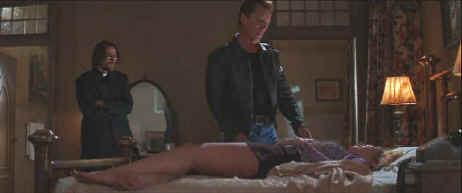Columbia/1998/108m/ANA 2.35, PS 1.33
Jack Crow leads a team of vampire slayers against the spiritual ancestors of Dracula and company. The team seeks out "nests" of vampires around the country. Financed by a branch of the Catholic Church, the slayers are provided with a hokey array of weapons for their fight against the powers of darkness. A pick-up truck and a van provide uncomfortable battle transportation. The rules of vampire engagement clearly state that where there’s a nest, there’s a master, or a stronger vampire that rules the nest. One might presume that the worker vampires even bring the master blood, but that may bee(sic) a stretch. God knows how these slayers have any idea where the nests are hidden. One supposes that reports of death by vampirical circumstance fill out the vampire map of the stars, a tour of typical vampire abodes laden with cobwebs and boarded up windows.
 |
Jack Crow checks on his link to Valek ©Columbia |
In the opening
sequence, Crow’s crew archly stalks and cleans out a nest of vampires in an abandoned
southwest farmhouse. In creaky fashion accompanied by "clever" comments, the
slayers do battle successfully. But a master fails to show up. This should give everyone a
clue for what comes next, but only the audience seems prepared. During a motel celebration
as carousing slayers play with local prostitutes, master vampire Valek appears out of the
night. Valek is a master of unprecedented power. He destroys all the members of the slayer
team except for Crow and his loyal fellow slayer Montoya. How they manage to survive the
confrontation with Valek is beyond me, but the film later supplies a reasonable
explanation. After all, what’s a great vampire without a great pursuer. After the
motel massacre, Crow and Montoya flee Valek taking along one of the prostitutes who has
been infected with a bite from Valek during a seduction scene of questionable taste. Crow
then meets with the Catholic Cardinal in charge of operation vampire to determine to plan
a strategy. Crow is saddled with a new, enthusiastic priest who tags along to make sure
the Churches needs are protected. Vampires struggles on it’s route to final
confrontation and the final scenes might have been lifted directed from the imagination of
a Jodorowsky (cult classic El Topo) or even Luis Bunuel.
James Woods plays Jack Crow with the all the dedication of
vampire slayer lost in a bloody bad script. Daniel Baldwin is laughable as the love bitten
Montoya. Sheryl Lee is lost in a vampire movie blood lust as the prostitute with a unique
link to Valek. Thomas Ian Griffith gets to bare his fangs as Valek, salaciously salivating
at the prospects of a bloody screen meal.
Vampires is a blood feast on DVD. Set mostly at night in
deference to the vampire aversion to sunlight, blood colors are richly served up in this
sharp anamorphic transfer. Hues are slightly hot, but this seems intentional. In fact,
Carpenter mentions use of red filtering in the early scenes. Shadow detail is well
rendered is difficult lighting circumstances. The Dolby Digital 5:1 surround is active,
accurate and packs a wallop. Carpenter’s unoriginal score drones on with a nice
twang.
This special edition DVD features John Carpenter’s audio
commentary. It is friendly and casual, noting performers and locations, but it’s best
when it focuses on technical detail. Seems like Carpenter has more elements of cinematic
homage in the opening sequence than viable content. Influences from Peckinpah to Leone are
happily acknowledged. Still, Carpenter spends far too much time telling the viewer what he
is seeing or is about to see. Truth be told, Vampires is a lot more enjoyable
listening to Carpenter talk about the film than watching it without commentary. In the
end, the script is a whole lot of "straw da chocolata wally"(listen to the
commentary 44-45m).